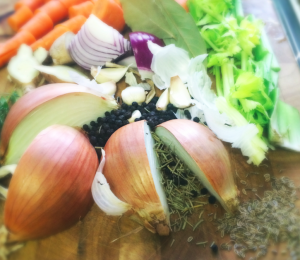Food fear is a thing. It is the little devil that lurks on one shoulder, feeding us nonsensical guidance about what we should, and should not be eating. For many years, I contended with deprivation because I feared that somehow most foods would hurt me, or alter my appearance for the worst. The broken record of my obsessive thoughts eerily repeated: I sure would love the pasta, but my hips and thighs are guaranteed to look like the noodles tomorrow if I do. Sticky rice would taste amazing right now with my spicy green papaya salad, but white rice is a fat maker! I so wish I could eat that creamy burrata cheese, but I know it will cause indigestion, and make my face break out.
I was convinced of these things, and so pretty much lived off of green smoothies, broccoli and tofu. They were safe…at least until unfermented soy products became body bullies, at which point I just ate broccoli, and sipped the smoothies.
Perhaps that is an exaggeration, but not by much.
I ate spinach too.
For about eight years I ate like a rabbit. Someone I dated during that deprivation decade gave me a nickname––He called me Asparagus Sprig. Looking back, I don’t believe it was endearing.
Going out to eat with friends, (which is suppose to be a pleasurable experience by the way), caused me Bach Remedy Stress Relief-level anxiety. I dreaded dining out because, well…spinach and broccoli can only be prepared so many ways.
After years of fiercely avoiding foods that MIGHT make me feel bad, I grew enormously disappointed. I discovered my bunny tooth diet was not doing me any good. I avoided gluten, swore off sugar, limited my fat intake, said ‘No’ to Corn, Wheat, Dairy, and Meat, and guess what I got in return!
Constipation
Acne
Gas
Bloating
Achy Joints
Water Retention
Fatigue
Headaches
Colds and Flu
Weak Muscles
I won’t bore you with the complete list. You get the point.
There is a silver lining to this story however, but to understand it, you have to believe that STRESS is far more the antagonist in the eater’s dilemma than food itself. Being stressed about, and constantly concerned with your food choices will make you sick, fat, and rob you of your happiness. Chronic food fear contributes equally to indigestion, IBS, bloating, fatigue, and sensitivities as do real allergies to gluten, wheat, corn, nuts, soy, and dairy.
Stress, almost more than anything is a grand source of compromised health.
Eating the broccoli + stress about actually wanting the pasta + feeling guilty for having two glass of wine (instead of eating the popovers) = fat. It = illness. It = chronic inflammation, pain, and boredom.
It = sucky, un-celebratory, limiting, and unhealthy.
Fortunately, I arrived at a place in my life where I was fed up (pun intended) with my food fears. I wanted to eat the bolognese and feel glad I did. I wanted to order a sandwich, and truly, fully, delight in every bite. I wanted to eat the bread (and not just suck the olive oil off that I had soaked the bread in. I know pathetic, but true.)
I did not only want to eat indulgent things, but I wanted grains of all kinds. I wanted white rice, really good crusty sourdough bread, delicate filets of fish, and fine cheeses once in a while.
And so I got there, one incremental eating victory at a time.
It is not an overnight fix, but it is absolutely worth the time and effort. The process, (drumroll please…this is the silver lining), is Sensory Eating.
Others may confuse this with mindful eating. It is not. Having the mind involved is exactly what throws us off our game in the first place! It is what leads us to commit to diets with fierce conviction. It is what causes us to routinely eat the same foods, never giving our bodies a chance to eat those in season, those that are appropriate for the regions we live in, and our varied lifestyles.
We have to take our minds completely out of the eating equation, and start SENSING rather than THINKING about what we should, and should not eat.
Now, you must be wondering what the heck I mean by Sensory Eating.
Below are seven steps to introduce you to this eating approach, and support you in practicing the one diet that truly rules them all.
1. When you eat, do nothing else, except maybe engage in cheerful conversation with those you love. Put away your phone. Step away from your computer. Get out of your car. Sit down. Avoid standing and walking while eating, and be fully present to your eating experience.
2. Prior to selecting what you are going to eat, close your eyes, take a couple deep breaths, and begin to relax your body from head to toe. Relax your face, release your jaw, relax the muscles in your neck, let you shoulders settle away from your ears, release the hold on your belly, release the muscles in your pelvic floor, and feel your toes spread wide into the floor beneath you. This should only take about thirty seconds, by the way.
Following this relaxation exercise, you will be in a state where you can ask your body what it needs, and actually hear it respond. The answers are subtle, but with regular practice, they do come, and you will begin to hear them more clearly. They do not linger as your mind starts to interject doubts to coax you back into routine, or to remind you of the commitment you made to a particular diet theory. This is why it is so important to slow down, relax, and release tension in the body prior to mealtimes. This is the only condition in which you will be able to listen with your gut, and not your mind.
3. Learn to cook, and make time each week to do it––even if you just make one meal each day! Enroll yourself in the therapeutic act of creating something delicious to eat. Cooking awakens your sense of smell. Adding ‘a little of this, and a touch of that’ revives your sense of taste, and watching your meal come together enhances your senses of sight and sound. All of these senses need to be activated in order to Sensory Eat.
4. Learn to smell your food before you eat it. Have you ever watched an animal approach food or even a dead bug on the floor as if to eat it? What do they do? They smell it first. Why? Because, 1) the smell alerts them that the item is safe to eat. Similarly, when you sniff your food before eating, you will begin to notice if something smells “off”, rancid, or just simply not right for you. 2) Smelling food activates digestive enzyme production. We need our enzymes working for us to effectively break down, assimilate, and properly absorb what we eat.
5. Bless your food. I am not suggesting you commit to a long, drawn out prayer, but rather just a quick and quiet moment to express gratitude for even having food to eat. Give thanks for who cultivated it, prepared it, and for having the means to buy it. This brief blessing will connect you to your eating experience, which should be a peaceful one. It will send the food into your body with love, so that it will love you back.
6. Chew. Chew. Chew. Eating with haste, no matter what you are consuming (even a blended smoothie) is destructive to digestion. We need time to mix food particles with enzymes. We need food to be chewed thoroughly to pass through our stomach and intestines with ease. We also need time for our stomach to sense we’ve had enough, and to signal our brain that we should stop eating. When we eat too fast, we tend to overeat. It takes about twenty minutes for our gut to know it has had enough! Slow down, and grind your food to a near liquid state before swallowing each bite. I promise you will feel a positive shift in your digestion AND energy levels, as the food will be more efficiently absorbed and utilized!
7. Allow for Intermittent Indulgences. Depriving yourself of tasty pleasures will diminish your health (and sanity)! Deprivation causes a build up of stress to the point we sometimes lose it! Just as the child with fiercely strict parents may rebel, if you don’t allow yourself to enjoy luscious creations like chocolate, ice cream, fine cheeses, a slice of pizza, a perfectly prepared scone, or anything else you dearly love to nosh on, you may end up rebelling by eating the WHOLE cake (and not just a slice) when you just can’t take the restriction any longer.
Rather than denying and then binging (or worse––never eating delicious bites again), learn to incrementally indulge.
I eat chocolate every single day, and I don’t feel the least bit guilty about it! I encourage you to do it too! You will feel so much better by choosing to treat rather than succumbing to deprivation where you might end up CHEATING. And thanks to step six above, you will know when your heart and gut are thoroughly satisfied by the tasty bites!
Sensory Eating is liberating. It is deeply nourishing, and is how we were designed to eat! It opens us up to variety in the foods we reach for, and optimizes our digestion, in turn supporting total wellbeing! I encourage you to give this approach a trial run this week. Please feel free to share your experiences with me in email!
Wishing you abundant health + happiness!












